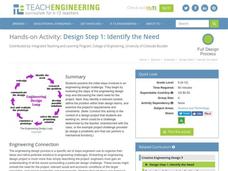Curated OER
The Writer’s Toolbox: What You Need to Master the Craft
All the tools (and directions) you’ll need to build an essay are included in a resource designed for learners and educators. The packet can be given to class members or divided into sections and used as part of a series of lesson on the...
George W. Bush Presidential Library and Museum
Teaching Primary and Secondary Sources
What makes a source primary or secondary? Middle schoolers read a definition of each term before exploring different examples and applying their knowledge to a research project.
National Arts Centre
Visual Metaphors in Scenic Design: Activity
As part of a study of how visual metaphors are used in set design, class members examine an image of designer Josef Svoboda's 3-D scale model for the opera Idomeneo, re` di Creta. They then find another example that employs a visual...
K12 Reader
Narrator and Point of View
Point of view is important when choosing a narrator. Help young writers distinguish between first and third person point of view with an activity that features excerpts from Robert Louis Stevenson's Treasure Island. After reading four...
Poetry4kids
How to Write a Free Verse Poem
Budding poets compose an original free verse poem. Encouraged to use personification and alliteration, scholars read over three tips and examples then try their hand at drafting a poem of their own style.
Poetry4kids
How to Write a Repetition Poem
A repetition poem is the focus of a lesson that challenges scholars to compose an original piece. To add meaning to their poem, authors choose words to repeat at the start of most lines.
Thoughtful Learning
Setting and Reaching Goals
An activity boosts self-management through goal setting and reflection. Scholars choose one goal they wish to obtain by the end of the week. Participants brainstorm ways to make their goal a reality then reflect on whether or not their...
K12 Reader
Possessive Pronouns
It's mine! No, wait, it's yours! Have your class members practice possessive pronouns so they can properly name who an item belongs to. For this exercise, pupils choose the correct possessive pronouns to complete 12 sentences.
Illustrative Mathematics
The Escalator, Assessment Variation
A great way to practice with unit rates, the activity gives your mathematicians an opportunity to compare different statements and select which are true. They can practice with "choose all that apply" by setting each statement into its...
Nature New Brunswick
Habitat for Endangered Wildlife and You
Compare and contrast your habitat with that of endangered plants and animals! Learners discuss what a habitat is actually comprised of, describing what theirs looks like. They fill out a graphic organizer explaining what they eat, how...
Super Teacher Worksheets
Writing Couplets
Sometimes, getting started is the hardest part; but that is not the case with this poetry worksheet that asks scholars to read through a list of rhyming pars, choose three, and use them to write a couplet poem.
Intel
What Does This Graph Tell You?
What can math say about natural phenomena? The fifth STEM lesson in this project-based learning series asks collaborative groups to choose a phenomenon of interest and design an experiment to simulate the phenomenon. After collecting...
K12 Reader
What Is a Simile?
As fun as a barrel of monkeys, this figurative language worksheet will engage your students in learning to write similes. Asking them to first think of adjectives describing the six nouns listed on the page, this exercise has young...
Curated OER
Describing Data
Your learners will practice many ways of describing data using coordinate algebra in this unit written to address many Common Core State Standards. Simple examples of different ways to organize data are shared and then practice problems...
McGraw Hill
The Units of the English System
Go from feet to inches to yards and back again with this notes and learning exercise combo resource. Several pages of examples regarding unit conversion of the English system are given, followed by different pages of problems. There is a...
Charleston School District
Scientific Notation and Appropriate Units
How do you write a number in scientific notation? The handout and video provide an explanation on how to convert from standard form into scientific notation and vice versa. The resource also contains a short discussion about choosing...
The New York Times
A Guide to Political Donations
Voters determine the outcome of elections, but campaign donors can influence the attitudes of those voters. Explore nine examples of donors and the amounts of money they want to contribute, and the legal ways the groups can or cannot...
Teach Engineering
Design Step 1: Identify the Need
What exactly does an engineer do? Learners find out through a lesson that asks them to solve a problem that affects a target population. Aspiring engineers learn the steps of the engineering design process as they apply it to a challenge...
New South Wales Department of Education
Is it Alive?
Interestingly enough, movement is not a characteristic of living things. The first activity in a series of 20 introduces learners to the concepts of living versus non-living things and then focuses on biologists and what they study....
Boston Symphony Orchestra
The Elements of Music—How do Composers Plan?
The introduction to Tchaikovsky's Swan Lake and the finale of his Symphony No. 4 provide young musicians with an opportunity to investigate the music elements composers employ to develop the themes they want to create. They compare the...
American Psychological Association
Sampling or Assignment?
Each discipline has its own vocabulary, terms it uses to identify key concepts and processes. Sample, to psychologists, refers to those people (participants) a researcher is studying, while assignment refers to the treatment conditions...
Anti-Defamation League
Women's Suffrage, Racism, and Intersectionality
The Nineteenth Amendment granted women the right to vote—as long as they were white. High schoolers read articles and essays about racism in the suffrage movement and consider how intersectionality played a role in the movement. Scholars...
Curated OER
Whether/Weather/Wether
Is it whether, weather, or wether? Learners explore the differences between these three words using examples and descriptions. They conclude by taking an interactive test.
Curated OER
Separate is Not Equal: Brown vs. Board of Education
Brown vs. Board of Education was a landmark case, but what other cases were influenced by its decision? By researching 1 of 14 civil rights legislative events, scholars follow this court case through recent events. Keeping in mind 6...

























